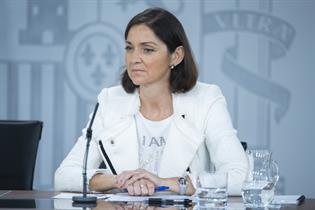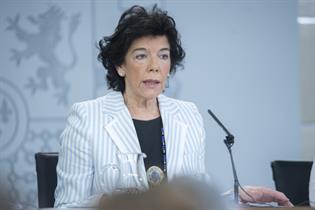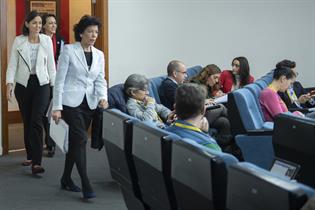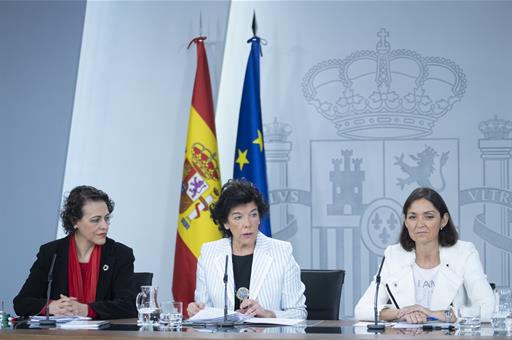Council of Ministers
Government approves 2019-2021 Action Plan for Youth Employment
Council of Ministers - 2018.12.7
Moncloa Palace, Madrid
In compliance with one of the 2030 Sustainable Development Goals, the government approved the 2019-2021 Action Plan for Youth Employment, which seeks to reduce the number of young people out of work and that neither study nor receive training. Funding of 2 billion euros has been made available in an endeavour to reduce the youth unemployment rate to 23.5% and to enable 168,000 unemployed under the age of 25 to enter the labour market.
The Minister for Employment, Migration and Social Security, Magdalena Valerio, highlighted that this plan will be highly beneficial for young people, "who not only represent the future but also the present", and for Spain, "because the country needs them, both economically and socially". "Committing to youth training and employment means committing to social cohesion", said Magdalena Valerio, who stated that young people have the right to their personal autonomy and independent lives. "In this way, they will learn to value the democracy in which they live and feel integrated", and avoid them being "tempted by apparently easy solutions to problems that are very complex", she argued.
The 50 cross-cutting measures contained in the plan are organised around six main pillars: guidance, training, job opportunities, equal opportunities in access to work, entrepreneurship and an improved institutional framework.
 Pool Moncloa/Borja Puig de la BellacasaDesigned using a very participative process between various ministerial departments, these measures received the unanimous support of the Board for Social Dialogue, on which the social stakeholders are represented. Furthermore, its implementation will be carried out in coordination with the regional governments, provincial councils and local authorities, "because this must be closely tied in at a local level, with all the authorities involved pulling in the same direction", remarked Magdalena Valerio.
Pool Moncloa/Borja Puig de la BellacasaDesigned using a very participative process between various ministerial departments, these measures received the unanimous support of the Board for Social Dialogue, on which the social stakeholders are represented. Furthermore, its implementation will be carried out in coordination with the regional governments, provincial councils and local authorities, "because this must be closely tied in at a local level, with all the authorities involved pulling in the same direction", remarked Magdalena Valerio.
Magdalena Valerio also announced that work is also underway on another action plan for the long-term unemployed over the age of 45.
Greater protection for persons with disabilities
The Council of Ministers approved the Draft Bill to Reform Article 49 of the Constitution to offer greater protection for the rights of persons with disabilities.
The Minister for Education and Vocational Training, and Government Spokesperson, Isabel Celaá, recalled that Article 49 of the Magna Carta represented a great step forward 40 years ago, but classifies these people as "handicapped". The government's proposal is to remove this term and incorporate a reference in the Constitution to the protection and promotion of the rights of persons with disabilities.
Isabel Celaá highlighted that the new constitutional drafting is a government initiative based on a proposal from the Commission for Comprehensive Policies on Disability and includes the participation of the Spanish Committee of Representatives of Persons with Disabilities (Spanish acronym: CERMI).
Industry, a priority objective
The Minister for Industry, Trade and Tourism, Reyes Maroto, specified the main aspects of the Royal Decree-Law on Urgent Measures to Boost Economic Competitiveness in the Trade and Industry Sector in Spain. "For this government, industry is a strategic sector", she claimed.
 Pool Moncloa/Borja Puig de la BellacasaThe fundamental aim is to raise the industrial GDP of our country from the current 16.3% to 20%: "We must place industry on the agenda for change, because it is a sector that exports, innovates and generates quality jobs, and we need it to gain more force because it will also allow us to combat the demographic challenge", explained the minister.
Pool Moncloa/Borja Puig de la BellacasaThe fundamental aim is to raise the industrial GDP of our country from the current 16.3% to 20%: "We must place industry on the agenda for change, because it is a sector that exports, innovates and generates quality jobs, and we need it to gain more force because it will also allow us to combat the demographic challenge", explained the minister.
The Royal Decree-Law substantially improves the relief contract for the manufacturing industry. It also regulates sales at a loss, a very necessary measure, according to Reyes Maroto, "to offer legal certainty to operators and reduce burdens on companies":
Other measures include the creation of closed electricity distribution networks on industrial estates to reduce energy costs and guarantee the competitiveness of companies already set up there, and the creation of the figure of the "electricity-intensive consumer".
Commitment to present Budget
The Council of Ministers approved the budget stability targets for 2019-2021, a necessary step in the passage of the General State Budget for 2019.
Isabel Celaá explained that these are the same targets as for the public deficit - 1.8% of GDP in 2019, 1.1% for 2020 and 0.4% for 2021 - that the government already sent to Parliament on 27 July but which were not approved by the Lower House of Parliament. The decision to once again approve the path of stability has been adopted after consulting the State Legal Services, which appreciates that this is a pre-requisite for the presentation of the Budget.
"The government will carry out this process because it is committed to pushing through the public accounts to shield the Welfare State, raise social spending, recover extensive rights and promote a fairer and better distributed tax system", said Isabel Celaá. This Budget, she added, will also allow the needs that the regional governments have outlined to the President of the Government, Pedro Sánchez, in the round of contacts that finalised this week, to be addressed.
The Government Spokesperson declared that the government's commitment is to take the Draft Budget to Parliament in January, with the deficit target that is in force at the moment. Hence, if the path approved on Friday is not achieved, the government will present the public accounts with the deficit path in force in the Lower House.
Fight against terrorism
 Pool Moncloa/Borja Puig de la BellacasaThe government approved a Draft Constitutional Law to transpose an EU Directive on the use of data on passenger names records for the prevention, detection, investigation and prosecution of terrorist offences and serious crime.
Pool Moncloa/Borja Puig de la BellacasaThe government approved a Draft Constitutional Law to transpose an EU Directive on the use of data on passenger names records for the prevention, detection, investigation and prosecution of terrorist offences and serious crime.
Isabel Celaá specified that these data will be notified to the competent authorities - for example, Interpol - in the case of international, European and even some national journeys, with the aim of raising security levels to combat organised crime and terrorism in the European Union, always within the legal framework of data protection. This information will be deleted after five years.
More than 200 million euros for education programmes
The Council of Ministers agreed to allocate almost 209 million euros to different education programmes for cooperation with regional governments. These areas of action include educational guidance, the funding of textbooks, quality actions for Vocational Training, boosting Dual Vocational Training, teacher mobility, the accreditation of professional skills and the activities of parents associations.
The Minister for Education and Vocational Training underlined the interest of these initiatives both for the regions and for her own department "because they bind together those programmes that we specifically want to promote", such as boosting Vocational Training and attention for students in need of extra support.
Promotion of scientific talent
The government authorised the State Research Agency to call a round of proposals for the sum of 101 million euros - 15.4% up on the 2017 figure - to hire 830 researchers and technical support staff.
 Pool Moncloa/Borja Puig de la BellacasaThe investment will be distributed among four sub-programmes under the State R&D+i Plan. Firstly, 200 'Ramón y Cajal' subsidies will be offered, with the aim of promoting the incorporation of Spanish and foreign researchers with a proven track-record in R&D centres. Secondly, there will be 225 'Juan de la Cierva-Training' subsidies for young doctors to complete their research training in Spanish R&D centres. The third heading includes 225 'Juan de la Cierva-Incorporation' subsidies to foster the hiring of young doctors. Lastly, 7 million euros are allocated to hiring technical support staff at research bodies.
Pool Moncloa/Borja Puig de la BellacasaThe investment will be distributed among four sub-programmes under the State R&D+i Plan. Firstly, 200 'Ramón y Cajal' subsidies will be offered, with the aim of promoting the incorporation of Spanish and foreign researchers with a proven track-record in R&D centres. Secondly, there will be 225 'Juan de la Cierva-Training' subsidies for young doctors to complete their research training in Spanish R&D centres. The third heading includes 225 'Juan de la Cierva-Incorporation' subsidies to foster the hiring of young doctors. Lastly, 7 million euros are allocated to hiring technical support staff at research bodies.
Other agreements by the Council of Ministers
- Authorisation of fast-track passage of technical and administrative terms and conditions for energy self-consumption.
- 12.9 million euros of subsidies approved for business projects that generate employment in coal mining districts.
- Approval of final proposal to declare Sierra de las Nieves (Malaga) a national park.
- Distribution of 8.1 million euros agreed for strategies to combat rare diseases, other health programmes and the resettlement and relocation of refugees.
- Authorisation to put out to tender new actions on the Cantabrian-Mediterranean Corridor for more than 58 million euros.
- Approval of implementation of 2nd Human Rights Plan in Spain.
Non official translation





